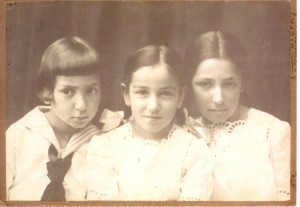Authors: Joanna Maksym-Benczew, Mariusz Patelski
Translation: Jadwiga Komornicka
JAN MICHAŁ ROZWADOWSKI AND HIS INTEREST IN SLAVIC LANGUAGES AND CULTURE
Jan Michał Rozwadowski – a biographical outline
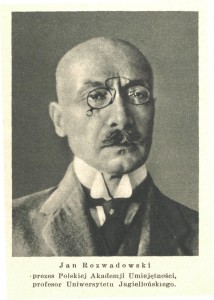
According to family tradition and the opinion of some researchers Professor Jan Michał Rozwadowski came from the Jordan-Rozwadowski family which was well known in Poland. That family gave rise to many outstanding people including leaders, politicians and diplomats as well as artists, academics and travellers. However, historians are not certain that the ancestors of the famous linguist were indeed the descendants of Jordan since most Rozwadowski family documents were destroyed during numerous wars and uprisings. The descent of the Cracovian professor’s ancestors was testified by indirect evidence: the family signet ring passed down from generation to generation with the Trąby (Trumpets) coat of arms used by the Jordan Rozwadowski family and the copperplate engraving on the tombstone of Jakub Jordan Rozwadowski, an ancestor of the family’s Lublin branch.
Jan Michał Rozwadowski was born on 7 December 1867 into the family of Juliusz and Celestyna, née Różańska in Czarna near Tarnów. Jan Michał was only a year old when he lost his father. Left with nothing to live on, his mother moved to Kraków where she got a job as a teacher in a girls’ school. Jan Michał attended St. Jacek’s secondary school in Kraków and passed his baccalaureate in 1885. He then studied Classical Philology, Polish and German at the Faculty of Philosophy at the Jagiellonian University in Kraków until 1889. During his studies in 1887 and 1888 he did military training in the Austro-Hungarian army and was promoted to the rank of lieutenant the following year.
In 1891 he obtained a doctorate in Philosophy. Between 1891 and 1893 he continued his studies in Leipzig with a scholarship from the Academy of Learning. At the turn of 1893 and 1894, under the pseudonym Jan R. Nadroj, he published “Pierwsza miłośc. Powieść” (First Love. A novel) The choice of pseudonym was not accidental, it was ‘Jordan’ if read backwards. His short stories were published in newspapers such as the Cracovian “Życie” and the Toruń “Gazeta Toruńska”. His creativity gained recognition among the editors of the Cracovian paper “Czas”. The young author won a literary competition announced by that newspaper, beating outstanding writers such as Kazimierz Tetmajer, Konstanty Górski and Tadeusz Rittner. However, he abandoned his further literary career in favour of linguistics.
His academic career developed successfully and in 1896 he qualified as a university lecturer on the basis of a treatise entitled “Quaestiones grammaticae et etymologicae”. In 1898 he obtained the position of Reader at the Jagiellonian University and in 1899 was appointed associate professor and in 1904 full professor. While at the Jagiellonian University he twice held the position of dean of the Faculty of Philosophy and in 1916 was elected rector, an office he did not accept. Language and literature students thought very highly of Professor Rozwadowski’s classes. According to Tadeusz Sinko: “they stood out for economy of style. After succinctly formulating a particular rule, the lecturer illustrated it with a few distinct examples so that notes after each lecture were no longer than quarter of a page long but at the end of the course we knew as much as is contained in the thick textbooks on a particular subject”.
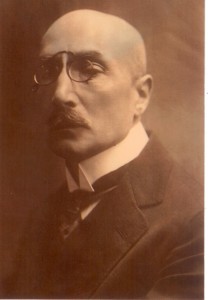 A significant chapter in Jan Michał Rozwadowski’s life was his work for the Kraków Academy of Learning. In 1903 the professor became a correspondent member and in 1908 an active member of the Academy. As a member of that renowned Polish academic institution from 1908 he ran the Language Committee of the Academy of Learning (from 1919 the Polish Academy of Learning). From 1918 to 1935 he headed the Oriental Studies Committee and from 1921 to 1935 the Anthropological Committee. In 1925 Rozwadowski became the head of the Polish Academy of Learning. After Józef Majer, Stanisław Tarnowski and Kazimierz Morawski he was the fourth chairman of that most important Polish research institution. He held the position until 1929 when he resigned from the chairmanship before the end of his term.
A significant chapter in Jan Michał Rozwadowski’s life was his work for the Kraków Academy of Learning. In 1903 the professor became a correspondent member and in 1908 an active member of the Academy. As a member of that renowned Polish academic institution from 1908 he ran the Language Committee of the Academy of Learning (from 1919 the Polish Academy of Learning). From 1918 to 1935 he headed the Oriental Studies Committee and from 1921 to 1935 the Anthropological Committee. In 1925 Rozwadowski became the head of the Polish Academy of Learning. After Józef Majer, Stanisław Tarnowski and Kazimierz Morawski he was the fourth chairman of that most important Polish research institution. He held the position until 1929 when he resigned from the chairmanship before the end of his term.
Rozwadowski’s interests in Slavonic Languages and Culture were expressed in numerous articles and studies. In 1908 together with Kazimierz Nitsch, Jan Łoś and Leon Mańkowski he published the first volume of the “Encyclopaedia of the Polish Academy of Learning”, being the actual editor of the linguistic part of that work. He played an active role in organising Polish philologists and linguists. Between 1920 and 1927 he headed the Society of Admirers of the Polish Language. He held a similar position in the Polish Linguistic Society from 1925 to 1931.
As a scholar and citizen Rozwadowski did not restrict his activity to academic issues. He frequently expressed his opinion on social and political matters. During the Ist World War he published an article “My a Ruś” (Us and Ruthenia) (Nowe Życie 1917) in which he demanded the negotiation of just relations between the two nations. In 1930 in Vilnius an East European Institute was established the aim of which was to research political, historical, and cultural problems as well as farm land and peoples between the Baltic and the Black Sea. It was not by accident that Jan Rozwadowski was elected chairman and Janusz Jędrzejewicz director.
In 1930 Professor Rozwadowski signed a protest by Cracovian academics on the Brześć issue. Three years later he wrote a fierce article entitled “Na powrozie” (On a rope) condemning a bill restricting the autonomy of universities.
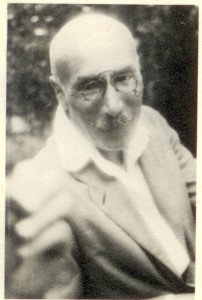 According to Kazimierz Nitsch: Jan Michał Rozwadowski “was in fact a conservative, but of a specific type, not recognising official religion and without manorial snobbery, yet he had an excellent way of communicating with peasants”. However, he was both privately and officially known for his optimism and sense of humour. An example of this is an anecdote from those days about a Polish officer in the Austro-Hungarian service, who used the term “pierdoła” (old fart) to express himself about Franz Joseph I. The Viennese military tribunal called the following professors from the Academy of Learning: Jan Michał Rozwadowski, Kazimierz Nitsch and Jan Łoś as experts who had the task of clarifying the meaning of that incriminating expression. The professors with Rozwadowski in the lead stated that “the term pierdoła in the Polish language is used to describe a good natured old man”. He also spoke very enthusiastically about the achievements of young Polish statehood and condemned those who criticised the Polish state for political reasons”. Rozwadowski’s optimism also manifested itself in chairing (from 1910) non-academic institutions such as the “Cracovia” football club. The view of the Cracovian editor of “Czas” about the professor was characteristic when he wrote among other things that “his essential quality (…) was his exceptional and engaging modesty. He was tall, slim and had a beautiful stance, he rarely spoke, a kind smile which was sometimes slightly ironic played on his face. He was very charming, did not overwhelm anybody with his academic solemnity, his manner with people was full of simplicity, he chatted amicably with young people who visited his daughters in his hospitable home at Smoleńsk street. He had neither enemies nor opponents. Few people were surrounded by admiration and friendship as he was”.
According to Kazimierz Nitsch: Jan Michał Rozwadowski “was in fact a conservative, but of a specific type, not recognising official religion and without manorial snobbery, yet he had an excellent way of communicating with peasants”. However, he was both privately and officially known for his optimism and sense of humour. An example of this is an anecdote from those days about a Polish officer in the Austro-Hungarian service, who used the term “pierdoła” (old fart) to express himself about Franz Joseph I. The Viennese military tribunal called the following professors from the Academy of Learning: Jan Michał Rozwadowski, Kazimierz Nitsch and Jan Łoś as experts who had the task of clarifying the meaning of that incriminating expression. The professors with Rozwadowski in the lead stated that “the term pierdoła in the Polish language is used to describe a good natured old man”. He also spoke very enthusiastically about the achievements of young Polish statehood and condemned those who criticised the Polish state for political reasons”. Rozwadowski’s optimism also manifested itself in chairing (from 1910) non-academic institutions such as the “Cracovia” football club. The view of the Cracovian editor of “Czas” about the professor was characteristic when he wrote among other things that “his essential quality (…) was his exceptional and engaging modesty. He was tall, slim and had a beautiful stance, he rarely spoke, a kind smile which was sometimes slightly ironic played on his face. He was very charming, did not overwhelm anybody with his academic solemnity, his manner with people was full of simplicity, he chatted amicably with young people who visited his daughters in his hospitable home at Smoleńsk street. He had neither enemies nor opponents. Few people were surrounded by admiration and friendship as he was”.
From 1924 Rozwadowski had financial difficulties caused by debts he had fallen into. According to his biographer, Stanisław Urbańczyk, as a result of that the scholar began to devote less time to academic work and resigned from the chairmanship of the Polish Academy of Learning. Professor Rozwadowski also developed an eye disorder so in 1933 and 1934 he underwent two cataract operations. In those years he spent more time reflecting about the sense of life, the fruit of which was a posthumously published philosophical work “Prawda życia” (The truth about life).
Jan Michał Rozwadowski was an honorary doctor of all the Polish universities (with the exception of the Catholic University in Lublin), a member of many academic societies, including Warsaw, Helsinki, Prague, the Academy of Science in St. Petersburg, Belgrade, Zagreb, Budapest, Sofia. He had numerous awards, the highest of which was the Order of the Rebirth of Poland with a Star.
Jan Michał Rozwadows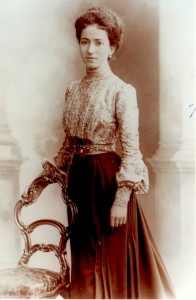 ki died suddenly on 14 March 1935 on the train from Warsaw to Kraków. The funeral of the great scholar took place on 18 March 1935 at Rakowice cemetery in Kraków. He was buried in the Trembecki firm vault at Rakowice cemetery in Kraków. Jan Michał with his wife Zofia (nee Bogdanowicz) had children: Zofia, Katarzyna and Jacek Feliks.
ki died suddenly on 14 March 1935 on the train from Warsaw to Kraków. The funeral of the great scholar took place on 18 March 1935 at Rakowice cemetery in Kraków. He was buried in the Trembecki firm vault at Rakowice cemetery in Kraków. Jan Michał with his wife Zofia (nee Bogdanowicz) had children: Zofia, Katarzyna and Jacek Feliks.
Slavonic interests in Jan Michał Rozwadowski’s academic oeuvre
Jan Michał Rozwadowski’s academic activity included, among others, general linguistics, Indo-European linguistics, Polish language and literature, Historical and Comparative Grammar, the Ethnogenesis of the Slavs and Slavonic Etymology. According to Stanisław Urbańczyk: ”It can confidently be stated that Rozwadowski was the creator of Polish onomastics, or at least its purely linguistic part”.
He began his work from Classical Philology, his first important study “De modo ac ratione, gua historici Romani numeros, gui accurate definiri non poterant, expresserint” (Ways of expressing approximate figures by Roman historians) was announced in Latin in “Rozprawy Wydziału Filologicznego Akademii Umiejętności” (Treatises of the Faculty of Philology, Academy of Learning) as early as 1889. However, Rozwadowski’s area of interest soon expanded towards Indo-European Linguistics and General linguistics. The significance of his oeuvre in the latter area is reflected in the opinion expressed by Antoine Meillet after the publication of the book “About the phenomena and development of language”.
“What a pity that this book has to date only appeared in Polish (…). Rozwadowski has a profound understanding of linguistic subtlety, the delicate aspect of language. Both scholar and poet, he knows how to notice and extract the power of expression hidden in language. When he explains that <everybody is a creator in language, both workers and artists all-in-one>, when he reveals the action of the most primeval and also the youngest forces of the soul, he gives a lesson from which all linguists may benefit”.
However, we are absorbed in the Slavonic interests of the chairman of the Polish Academy of Learning, and these can be found in his works in the field of Indo-European linguistics. Jan Safarewicz emphasises that: “With exceptional talent and great diligence Rozwadowski mastered the material which was available at the time, standing in the first line with contemporary Indo-Europeanists”.
Rozwadowski announced several comparative treatises, he described the methodological and theoretical rudiments of his work in 1910 in a lecture given in Lwów entitled “The current state of Indo-European linguistics”. He clearly opposed the positivist method and drew attention to the importance of considering the psychological and sociological aspect of linguistic phenomena. Among the articles on comparative and historica grammar there were: a work on Slavonic verbs announced in German in 1894 in a text entitled “The issue of Slavonic iteratives” (Zu den slavischen Iterativa); then a three-part study “Grammatical and etymological issues” featured in “the Treatises of the Faculty of Philology, Academy of Learning”, part I in 1897, part II in 1900 and part III in 1902 in a “Report from meetings held at the Academy of Learning”. We here find among others research regarding the fate of the Slavonic suffix –ica, the vr- group of consonants in Slavonic languages and the lexical relations between the Slavonic and Iranian languages. The next study “About the primordial relationship between the Baltic and Slavonic languages” was announced in 1912 in the “Rocznik Slawistyczny” (The Slavonic Yearbook). In the research on Slavonic languages it is worth paying attention to the phonetic studies devoted to particular languages, e.g. Bulgarian in the articles: ”Bulgarian pronunciation” from 1898 and “A contribution to Bulgarian phonetics (pronunciation)” in 1911 or the Belorussian language in “Comments about diphthongs ie uo in the south-western Belorussian dialect” in 1904 and “Fragments about historical phonetics of Slavonic languages”.
One of three entries studied by Rozwadowski for the “Encyclopaedia of the Polish Academy of Learning” (vol. II, Kraków 1915, pp.36-72) turned out to be highly significant in later linguistic research. That was the article “The relationship between the Polish language and other Slavonic languages”, which became a starting point for further research on the links between the Polish language with the Lusatian languages in the works of Witold Taszycki (The position of the Lusatian language [in:] “Symbolae grammaticae in honorem Joannis Rozwadowski” Kraków 1927) and Zdzisław Stieber’s “Similarities between the Lusatian languages”, Kraków 1934. Ewa Siatkowska in “Lusatian studies” drew attention to the special influence which Rozwadowski had on further research on the Lusatian languages.
What interested the Cracovian linguist in Indo-European research was the question of the Indo-European place of origin and the Slavs’ place of origin and the treatise concerning the localisation of peoples speaking Indo-European languages in pre-historic times. When establishing the localisation of the Proto-Indo-European language Rozwadowski saw the possibility of reaching a conclusion on the basis of purely linguistic phenomena, those which are most closely linked with the land, i.e. geographical names and particularly the names of rivers and to a lesser extent the names of mountains. A second range of linguistic facts which included his findings were the manifestations of mutual linguistic relations between specific tribes (the comparative articles devoted to the links between the Slav, Baltic and Iranian languages have earlier been mentioned).
Extensive deliberations on the original homeland can be found in three works: in a lecture given in 1911: “The Indo-European place of origin (About the earlier settlements of the Indo-European tribe)”; in an article from 1925 or 1926 which was not published during the author’s lifetime “The so-called place of origin of the Indo-European peoples” and in a report presented at a reunion of Slav historians in Warsaw in 1927 “Critical remarks about the so-called place of origin of the Slav peoples”. In this last text on the basis of research conducted over many years the author pointed to the difficulties in solving the complicated issue of establishing the so-called place of origin of the Slavs and warned against the practice of putting forward too hasty conclusions on the basis of linguistic material which historians of the time had a habit of doing. Rozwadowski himself presided over the work of naming waters, the results of which he presented in editing comprehensive expressions concerning the place of origin of Proto-Indo-European and Slav peoples, for the rest of his life. The academic’s main work on this subject “Studies on the names of Slav waters” did not appear until 13 years after his death in 1948 whereas his first articles about these questions began appearing as early as in 1900 “From studies on the names of Slav rivers”, a year later “Studies on the names of Slav rivers I. The Vistula basin. The results of Professor Rozwadowski’s research on this subject were announced every few years in either separate articles or as monographs to debates on the ethnogenesis of the Slavs. Towards the end of his academic activity, on the basis of his in-depth analysis of names of rivers such as the Wisłok, Sanok, Sana, Sanica, Bużek, Dunaj, Dunajec Rozwadowski was inclined to situate the place of origin of the Slavs in areas lying to the east of the river Dnieper, i.e. on the left hand of the Ukraine. Despite his detailed analysis he never reached hasty conclusions, evidence of which can be found at the end of his 1927 presentation: “ We see (….) how most of what concerns the historical past of the Slavs in the epoch preceding our era is unknown. Linguistic factors, ethnic construction, the epoch and the place which could have seen the birth of the Slavs are still immersed in profound obscurity. ”
His academic achievement which was published as was evaluated by his contemporaries “was not in proportion to the enormity of his erudition and the depth of his comprehensive academic vision”. Yet many of his propositions have a permanent position in erudition and as Stanisław Urbańczyk wrote in 1959: “Among linguists alongside Baudouin, Rozwadowski is considered the greatest among deceased linguists. That’s quite something”.
Bibliography:
Biblioteka Zakładu Narodowego im. Ossolińskich, sygn. 7989/II Materiały do historii rodziny Rozwadowskich (Rozwadowski Family History Materials), vol. I
Dziesięciolecie Polski Odrodzonej. Księga pamiątkowa 1918-1928, ed. by Jan Rozwadowski, Warsaw 1928.
Grodziski S., Franciszek Józef I, Wrocław 1990
Jedynak S., Filozofia Jana Rozwadowskiego [In:] Studia z polskiej myśli filozoficznej 1900-1939, ed. by Leszek Gawor, Lublin 1997
Lehr-Spławiński T., Szkice z dziejów rozwoju i kultury języka polskiego, Lwów-Warszawa 1938.
Lustgarten J., Narodziny krakowskiego sportu (The birth of Cracovian sport), [In:] Kopiec wspomnień (A heap of memories), Kraków 1964
Rozwadowski J.M., Wybór pism,. Vol. I. Pisma polonistyczne, Warszawa 1959
Rozwadowski J.M. Wybór pism. Vol. II. Językoznawstwo indoeuropejskie, Warszawa 1961
Ruszczyc F., Dziennik, part II: W Wilnie, Warsaw 1996
Siatkowska E., Studia łużyczoznawcze, Warszawa 2000
Urbańczyk S., Biogram Jana Michała Rozwadowskiego, Polski słownik biograficzny, vol. XXXII, Wrocław 1989-1991
Author’s collection, E. Rozwadowski, Historia rodziny Jordan Rozwadowskich, on the basis of „Kronika Rodzinna”(Family Chronicles) by Adam Rozwadowski and „Rozwadowski documents” from the Ossolineum Library in Wrocław
Résumé
Professor Jan Michał Rozwadowski came from a well-known family in Poland, the Jordan-Rozwadowskis. That family gave rise to many outstanding personalities including leaders, politicians and diplomats. In that circle Jan Rozwadowski acquired exceptional fame as an excellent academic – linguist. Slavonic works held a particularly strong position in the professor’s extensive oeuvre. Jan Rozwadowski was the author of studies devoted to the phonetics of various languages (among others Bulgarian and Belarusian) as well as works in which he deliberated over the ethnogenesis of the Slavs.

